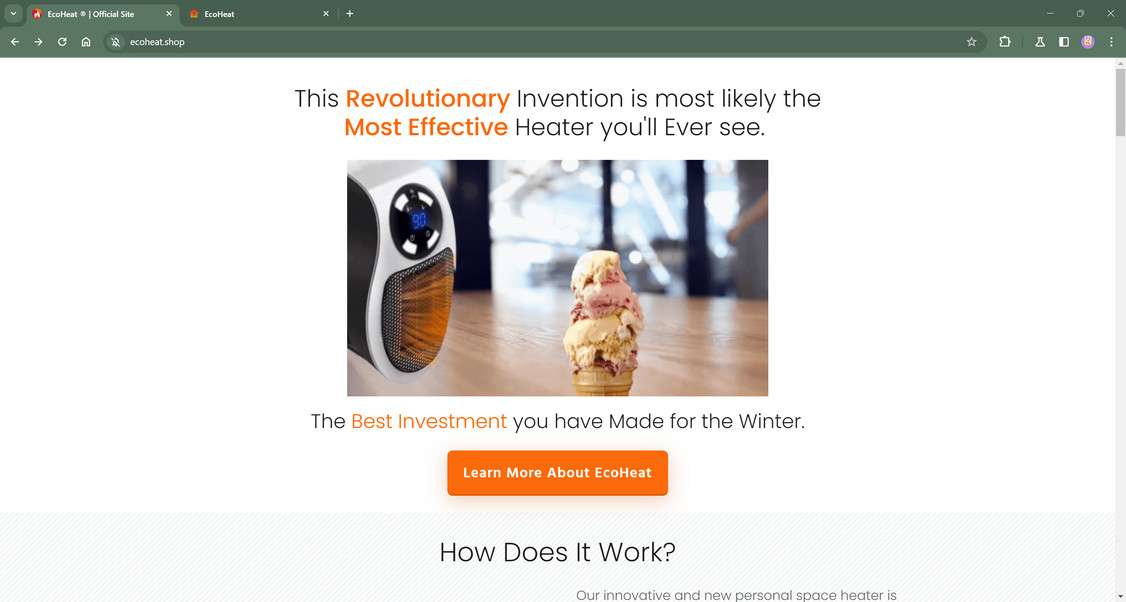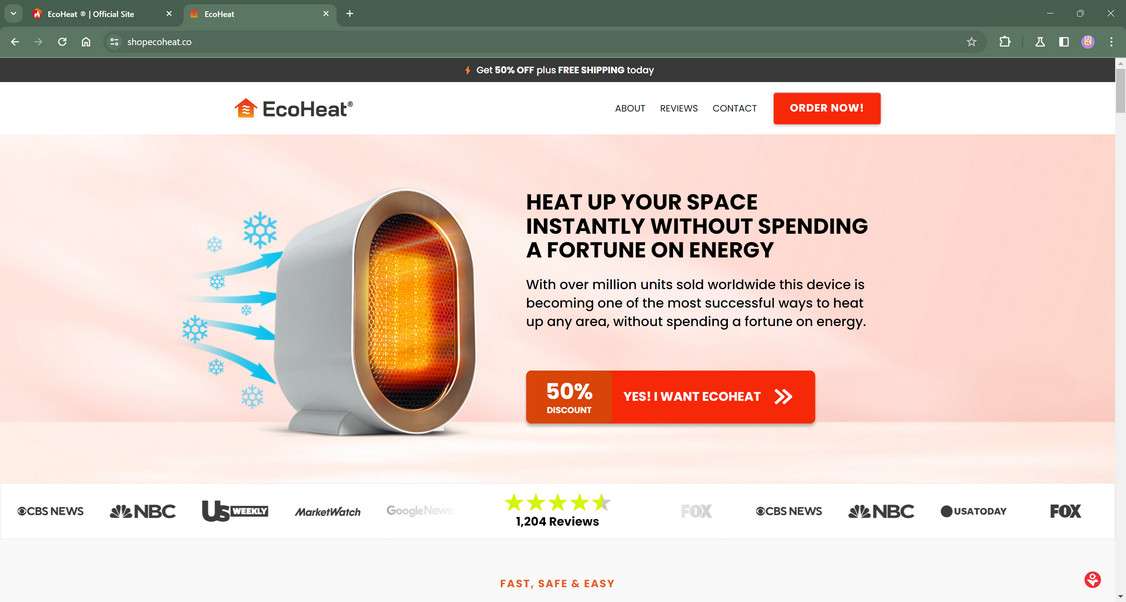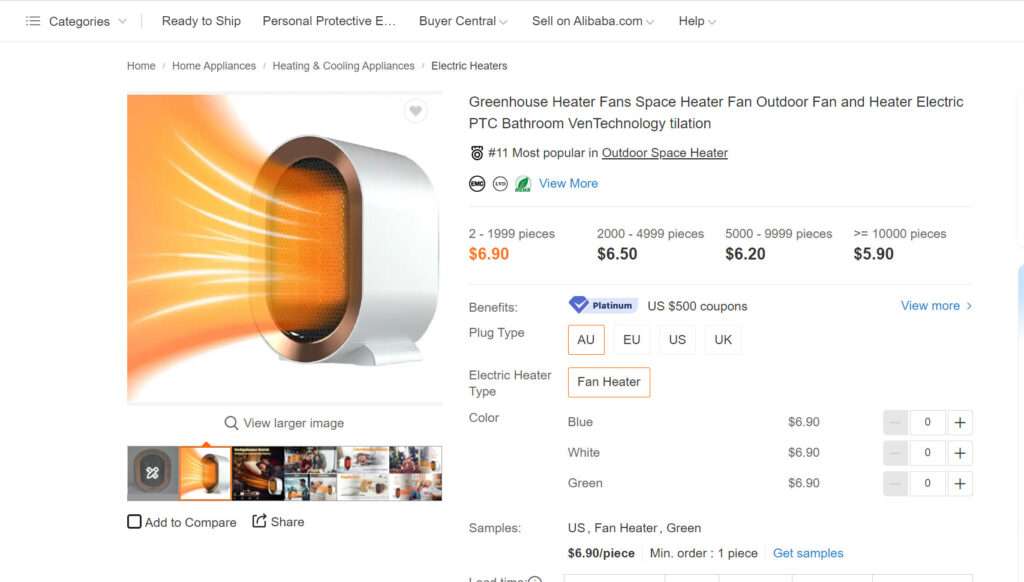EcoHeat portable heaters have been heavily promoted online and on social media, but many of the claims made about these heaters are wildly exaggerated or outright false. This article will provide a detailed overview of the EcoHeat scam, explain how it works to deceive consumers, give guidance for victims, and summarize the key facts to know about this predatory scheme.


This Article Contains:
Overview of the EcoHeat Portable Heater Scam
EcoHeat portable heaters are aggressively promoted through social media ads and websites making impressive claims about their performance and capabilities. However, none of these claims seem to hold up – victims consistently report receiving cheap, ineffective plastic heaters that do not work as advertised.

This scheme operates by utilizing fake testimonials, misleading demonstrations and other deceptive marketing tactics to promote EcoHeat heaters as an amazing winter necessity. The goals are to mislead as many consumers as possible, overcharge them for inexpensive products, and prevent refunds after taking their money.
Some examples of the dubious claims made in EcoHeat scam ads include:
- EcoHeat provides “instant heating” and will heat up large spaces in just seconds after being turned on. Real owners report it takes much longer even to provide minimal warmth.
- EcoHeat is advertised as using advanced “ceramic convection heating technology” when it is mainly just a basic electric coil inside a plastic housing.
- Ads boast EcoHeat is ultra-quiet or makes “no noise” when running. In reality, owners report a very audible buzzing sound during operation.
- Marketing claims EcoHeat is the “most efficient” and “energy friendly” option for personalized heating, which is false according to expert analysis of its design and power usage.
- EcoHeat is touted as being safe, portable, able to destroy dust/bacteria and even able to remove odors and freshen air. Customers find none of these claims to be true.
- Fake reviews on EcoHeat websites and ads praise it as an amazing product and the “best purchase” of last winter. These are completely fabricated to boost conversions.
Make no mistake – the elaborate EcoHeat scam is designed to prey on consumers looking for an effective heater during winter months through deception. We’ll explore exactly how this fraudulent scheme works in the sections below.
How the Scam Spreads on Social Media
The EcoHeat scam relies heavily on fake social media ads to reach targets. Here are some of their main tactics:
- Facebook ads – The scammers routinely run Facebook ads loaded with misleading claims, fake reviews and fake celebrity endorsements. The ads also use urgent messaging like “50% off limited time deal!” to push people to purchase quickly.
- Instagram influencers – The scammers pay influencers on Instagram to promote EcoHeat to their followers using a unique promo code or link. This makes the ads seem more genuine.
- TikTok videos – Short TikTok videos demonstrate EcoHeat and make unbelievable claims that go viral, further spreading the scam.
- Youtube ads – The scammers run YouTube ads with fake demonstrations and testimonials about EcoHeat. The goal is to mislead viewers into visiting their sites.
Overall, the scam is spread across social media platforms through ads and influencers designed to mislead, lure clicks and drive purchases of these overpriced, underperforming heaters.
How the EcoHeat Scam Works
Now that we’ve covered the overview, let’s explore step-by-step exactly how the EcoHeat scam operates at each stage:
Stage 1: Misleading Social Media Ads
The first step is misleading social media ads. As outlined above, the scammers use Facebook, Instagram, YouTube, TikTok and more to run ads making wild claims about EcoHeat portable heaters.
Some examples of the dubious claims made in these ads include:
- EcoHeat provides instant, rapid heating that will heat up any room in seconds
- EcoHeat is ultra safe and uses special patented technology
- EcoHeat is the most efficient and energy friendly portable heater
- EcoHeat destroys dust and bacteria for clean fresh air
- EcoHeat is silent and makes no noise
- EcoHeat is portable and convenient for use anywhere
- EcoHeat has thousands of positive reviews and a 4.5/5 star rating
- EcoHeat is loved by celebrities like Courtney Cox and Sam Elliot
These claims are designed to impress viewers and make them think EcoHeat is an amazing must-have heater. However, as we’ll cover, many of the claims are outright lies or extremely misleading.
The ads also use other tricks like fake reviews, fake badges like “Amazon’s Choice,” urgent messaging about deals expiring soon, and social proof with claims the product is very popular and selling out quickly.
Stage 2: Landing Pages That Continue the Deception
If someone clicks on one of these deceptive social media ads, they are sent to a sales page designed continue misleading potential victims.
Some common tactics seen on the landing pages include:
- More fake testimonials and reviews claiming EcoHeat worked amazingly during winter months
- Fake claims about safety certifications and awards won by EcoHeat
- Fake scarcity messaging like “Only 37 left!” to urge hurried purchases
- Countdown timers pressuring visitors to buy before a made-up deadline
- Options to purchase multiple EcoHeats at a “discounted bundle” price
These sites also make it very difficult to locate any actual details about the company selling EcoHeat. There are no company names, addresses or contact information provided.
Some victims report the payment pages do not even list details about EcoHeat itself – just a purchase button and fields to enter your payment info. This is a major red flag.
Stage 3: High Pressure Sales Tactics After Purchase
If someone purchases EcoHeat from these deceptive sites, the issues only continue after the purchase. Many victims report receiving harassing calls and emails pressuring them to buy more or upgrade their order.
Some common issues faced by EcoHeat buyers:
- Aggressive upsells immediately after purchase trying to double the order
- Getting signed up for subscription plans without consent
- Being bombarded with more dubious ads for products like EcoHeat
- Fake shipping notifications designed to stop credit card disputes
The point is to extract as much money as possible even after an initial purchase. The scammers will utilize every trick possible to milk victims through upsells, recurring charges and more.
Stage 4: Refusing Refunds and Ignoring Complaints
A common tactic used by EcoHeat scammers is to immediately refuse any refund request and then disappear without responding to further complaints.
Here are some issues reported by EcoHeat buyers trying to get a refund:
- Customer service numbers that hang up, disconnect or redirect to unrelated businesses
- Emails receiving automated responses only or no replies at all
- Refund requests denied with claims like “you missed the 30 day refund window”
- Return packages being refused or ignored by the company
- Credit card disputes getting rejected using fake shipping information
- Zero way to contact the company or people behind the scam
This refusal to issue refunds even when the heaters clearly do not work as advertised is a tell-tale sign of a scam. Legitimate businesses do not repeatedly ignore customer complaints and deny refunds like this.
What to Do If You Have Fallen Victim to the EcoHeat Scam
If you unfortunately purchased an EcoHeat heater and found it to be nothing like advertised, here are some tips on actions you can take:
Step 1: Request a Refund Immediately
Your first step should be requesting a refund immediately from whoever processed your payment. This could be:
- The credit card you paid with – Call the card issuer and report the charges as fraudulent. Dispute the charges and ask for a chargeback refund.
- PayPal – Report the transaction as fraudulent to PayPal and request a refund. Provide details on how the product was a scam.
- Payment Processor – If you paid through a processor like Klarna, affirm, etc, report the issue and ask them to reverse the charges.
The quicker you act to report the issue and request a refund, the better. Do this as your first step.
Step 2: Gather Evidence About the Scam
To support your refund request, collect as much evidence as you can about the misleading claims versus the actual product received. Useful information includes:
- Screenshots of the social media ads making false claims
- Copies of the deceptive claims on the website you ordered from
- Photos comparing the real product to how it was depicted online
- Videos of the product in use failing to heat properly
- Details on issues contacting customer service for a return
The more proof you have to demonstrate it was a scam and nothing like described online, the stronger your refund case will be.
Step 3: Report the Scam
An important step to prevent more fraud is reporting these shady sellers. Some places you can file reports:
- FTC Complaint Assistant – File a complaint about the scam here
- State Attorney General – Lookup the AG in your state and report the scam to them as well.
- RipOff Report – File a scam report about EcoHeat here to warn others.
- Reviews – Leave online reviews detailing the scam on sites like Trustpilot and others. This helps warn other potential victims.
When possible, try to identify and report the exact merchant names, websites, social media pages and people behind the fraud. The more reports filed, the more likely action will be taken to shut these scammers down.
Step 4: Warn Others About the Scam
To prevent others from being defrauded, kindly warn friends and family to avoid EcoHeat scams online. Share this article and details on social media using hashtags like #EcoHeatScam. This helps get the word out and reduces the scammers’ ability to fool more people.
Frequently Asked Questions About the EcoHeat Scam
Looking for answers about the misleading EcoHeat portable heater ads and websites? This FAQ covers common questions regarding this prevalent scam.
What exactly is the EcoHeat scam?
The EcoHeat scam involves using fake social media ads and deceptive websites to promote EcoHeat as an incredible portable heater that will heat any room in seconds. However, victims report the actual products sold do not work nearly as well as described. The goal is to overcharge consumers as much as possible for cheap, ineffective heaters.
How do the scammers advertise EcoHeat?
The scammers rely heavily on Facebook ads, Instagram influencers, YouTube ads and TikTok videos making impressive claims about EcoHeat heaters. The ads feature fake demonstrations, fake customer reviews, fake certifications and other tactics to mislead viewers.
What false claims do the ads make?
Some common dubious claims are that EcoHeat provides instant heating, is ultra safe, silent, energy efficient, able to destroy germs, rated highly by reviewers, and more. However, real customer reviews reveal these claims are lies.
What happens after you click one of the fake EcoHeat ads?
The ads send clicks to shady websites that continue the deception using fake scarcity, fake awards, misleading terminology, and more. These sites push people to purchase quickly before reading the fine print.
Can you get a refund if you realize EcoHeat is a scam?
Many victims report the EcoHeat scammers immediately deny refunds and then disappear without responding to further complaints. Getting money back once they have your credit card information can be very difficult.
What are signs the ads and sites selling EcoHeat are a scam?
Red flags include no company information provided, exaggerated claims, only accepting payment by credit card, aggressive upselling, refusing refunds, and no way to contact the seller. This is not how legitimate businesses operate.
What should you do if you purchased an EcoHeat heater?
If you purchased one of these heaters and realized you’ve been scammed, contact your credit card company immediately to dispute the charges and request a chargeback refund. Also file complaints with consumer protection agencies.
How can you avoid getting scammed by fake ads like these?
Be wary of “miracle” products pushed heavily on social media ads. Check for real customer reviews and do research on the seller before buying. Only purchase from reputable websites you know and trust.
How can I report an EcoHeat scam ad or site?
You can report fraudulent ads, websites and sellers to the FTC, state attorney generals, RipOff Report, social media platforms, and online review sites. Reporting the scam helps prevent others from falling victim.
Hopefully this FAQ helps explain how the misleading EcoHeat ads work and provides guidance if you encounter this prevalent scam. Be an informed consumer and do your research before purchasing gadgets promoted heavily online.
The Bottom Line on the EcoHeat Scam
In summary, here are the key facts to understand about the predatory EcoHeat scam:
- Misleading Ads – Social media ads make exaggerated or false claims about EcoHeat using fake reviews and photos.
- Deceptive Websites – Scam landing pages continue the deception with fake claims of awards, certifications and scarcity.
- Aggressive Sales Tactics – Scammers utilize aggressive upselling and recurring charges after getting credit card info.
- No Refunds Allowed – Fraudsters refuse refunds and ignore complaints about the heaters not working as promised.
- Cheap Heaters Marked Up – Despite claims, victims report the real EcoHeat units purchased are cheap, ineffective plastic heaters being sold at insane markups.
- Report Fraud & Warn Others – Reporting the scam and leaving reviews helps authorities crack down while warning other consumers.
Consumers looking for space heaters should avoid EcoHeat units sold online with unbelievable claims. Stick to trusted brands sold through reputable retailers. Be skeptical of “miracle” products promoted heavily on social media ads. Carefully research the seller before purchasing.
Hopefully this guide provides a useful overview of how the EcoHeat scam operates plus some advice if you unfortunately get defrauded. Stay vigilant for scams promoting questionable products on social media and do your research before buying.










